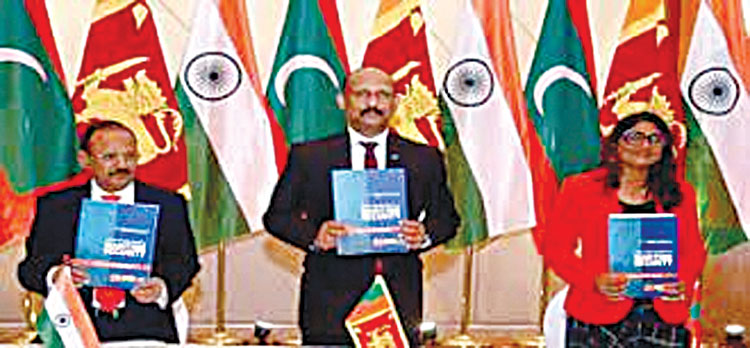At Colombo Security Conclave, India calls for close cooperation to tackle trafficking, transnational crime
Male/New Delhi, March 9 (Bureau) India on Wednesday called for setting up of a joint working group involving stakeholders from member countries of the Colombo Security Conclave and its observer nations on tackling trafficking and transnational organised crime. At the National Security Advisor-level Fifth Colombo Security Conclave, held in Male today, NSA Ajit Doval said: “We remain vulnerable to the threats of trafficking and organised crime and maritime terrorism, particularly in the light of the developments in Afghanistan. The problem of narcotic trafficking has intensified in the last one year. This is evident in the growing number of seizures over the past year.” He said that based on specific intelligence, a joint operation of India’s Narcotic Cotrol Bureau and the Indian Navy alongwith their Sri Lankan counterparts recently seized over 800 kgs of high quality drugs in the high seas valued at over USD 265 million.
“Our agencies and services have been continuously working for various such intelligence inputs and will carry out more such operations. Close cooperation on such issues could be in our mutual interest.” He said that members and observer states of the Colombo Security Conclave have been closely coordinating efforts to mitigate this problem. “This includes sharing information and intelligence on trafficking routes, modus operandi of operations and organised crime networks.” “A mechanism of such a joint working group involving relevant stake holders from all members and observer states on trafficking and transnational organised crimes will be a step in the right direction.” “We should work to finalise the modalities of such a mechanism,” he said, adding that cooperation in cyber security and emerging technology is an area that requires deeper engagement among the members.
Earlier, in his speech he said that today’s was the first meeting of the NSAs after they agreed to expand the scope of the trilateral cooperation under the Colombo Security Conclave. The India, Sri Lanka, Maldives NSA-level dialogue expanded to include Mauritius today as the fourth member. NSAs from six nations – India, Sri Lanka, the Maldives, Mauritius, Bangladesh, and Seychelles — participated in the conclave, with maritime security in the region the prime focus. “In our meeting today we have the opportunity to move forward in institutionalising our cooperation with a concrete road map and a defined charter of objectives,” he said. “As maritime neighbours we face common security challenges. Our national security is deeply intertwined with our collective security aspirations in this region.” He said that their coasts are vulnerable to numerous threats such as maritime terrorism, smuggling and trafficking. “There are numerous strategic installations on our coast that are vital for the security development and prosperity of our nation and our people.”
Coastal security involves the security of ports, maritime border management, island security, maintenance of peace, stability among other things. “India is committed to work in close cooperation with our maritime neighbours and collectively enhance our capacities,” he stressed. He also said that their country coordinators are discussing the possibility of an oceanography conference this year. “We should encourage the respective nodal points in our countries to identify concrete cooperation initiatives in these areas.” The Colombo Security Conclave was founded as a trilateral security framework between India, Sri Lanka and the Maldives with four pillars of security cooperation, covering marine safety and security, human trafficking, counter-terrorism, and cyber security. At the meeting, Mauritius became a full-fledged member of the Colombo Security Conclave. This grouping now focuses on the four pillars of cooperation identified within the framework as: Maritime security cooperation Terrorism and radicalisation Transnational organised crime Cybersecurity and critical infrastructure protection.

